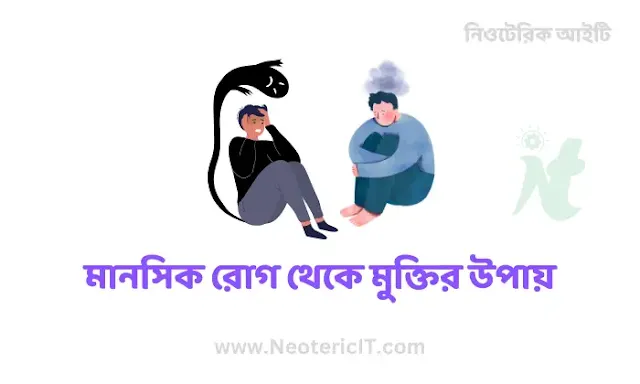Physical symptoms of mental illness Ways to get rid of mental illness
Hello dear guest - Welcome to Neoteric IT . You have come to Neoteric IT for information about Physical symptoms of mental illness Ways to get rid of mental illness Today I will conclude this article by discussing Physical symptoms of mental illness Ways to get rid of mental illness in detail. Search Google to know more about Physical symptoms of mental illness Ways to get rid of mental illness write Physical symptoms of mental illness Ways to get rid of mental illness or click here insightflowblog.com for visit. See the page Table of content for know the main topic of this article. Web story and AMP Version
Dear friends, if we don't work according to our mind or because of any failure, we get mentally broken. And without finding any way, he became disoriented.
Physical Symptoms of Mental Illness - Ways to Get Rid of Mental Illness - mental illness - NeotericIT.com
Physical symptoms of mental illness
Mental illness can manifest in many ways, including physical symptoms. These physical symptoms can include changes in appetite and weight, fatigue, muscle tension and pain, sleep disturbances, and digestive problems.
Changes in appetite and weight can occur with a variety of mental illnesses, including depression and anxiety. Depression can lead to loss of appetite and weight loss, while anxiety can lead to overeating and weight gain.
Fatigue is a common symptom of depression and can also occur with anxiety disorders. Differentiating between physical and mental fatigue can be difficult, as both can cause feelings of tiredness and low energy.
Muscle tension and pain can occur with anxiety disorders, especially generalized anxiety disorder and panic disorder. Persistent muscle tension can lead to headaches, back and neck pain, and other types of pain.
Sleep disturbances are common with several mental illnesses, including depression and anxiety. Insomnia, or difficulty falling asleep and staying asleep, is a common symptom of depression and can also occur with anxiety disorders. Nightmares, night sweats and night terrors can also be symptoms of mental illness.
Digestive problems can occur with various mental illnesses, especially anxiety disorders. These problems can include nausea, stomach cramps and diarrhea.
It is important to remember that not all people with mental illness will experience physical symptoms and not all physical symptoms are caused by mental illness. However, if you experience physical symptoms and suspect they may be related to a mental illness, it is important to seek help from a qualified healthcare professional. A mental health professional can help you identify the underlying cause of your symptoms and provide you with appropriate treatment and support.
Ways to get rid of mental illness
Mental illness is a serious and complex problem that affects millions of people worldwide. It can manifest in many ways, including depression, anxiety, bipolar disorder, schizophrenia, and more. Although there is no "cure" for mental illness, there are many effective ways to manage and treat it.
Therapy:
One of the most effective ways to manage mental illness is through therapy. These may include talk therapy, cognitive-behavioral therapy (CBT), and other forms of psychotherapy. These therapies can help individuals understand and manage their thoughts and emotions, develop coping strategies, and improve their overall mental health.
Medicines:
Another common method of managing mental illness is through medication. Antidepressants, anti-anxiety medications, and antipsychotics are all commonly used to treat mental illness. It is important to work closely with a mental health professional and a doctor to find the right medication and dosage for each individual.
Support Group:
Joining a support group can be a great way to connect with others who are going through similar experiences. Support groups can provide a sense of community, help individuals feel less alone, and provide opportunities for individuals to share their thoughts and feelings in a safe and supportive environment.
Lifestyle changes:
There are many lifestyle changes that can help individuals manage mental illness. Eating a healthy diet, exercising regularly, getting enough sleep and avoiding drugs and alcohol can all help improve mental health.
Relaxation Techniques:
Relaxation techniques such as yoga, meditation and deep breathing can be helpful in managing stress, anxiety and depression. These techniques can help reduce symptoms of mental illness and promote overall well-being.
Mindfulness:
Mindfulness is the practice of being present and aware in the moment. It can help individuals focus on the present and let go of negative thoughts and feelings. Mindfulness techniques can be incorporated into therapy, daily life, and many other aspects of mental health treatment.
Electroconvulsive therapy (ECT):
ECT is a medical treatment that uses electrical stimulation to treat certain mental illnesses. It is usually used as a last resort for people with severe depression, bipolar disorder and schizophrenia who have not responded to other treatments.
Transcranial Magnetic Stimulation (TMS):
TMS is a non-invasive treatment that uses magnetic fields to stimulate nerve cells in the brain. It is FDA-approved for treatment-resistant depression, and is being studied for other mental health conditions.
Light therapy:
Light therapy involves exposure to bright light, which can be helpful for people with seasonal affective disorder (SAD) and other forms of depression.
It's important to remember that mental health treatments are not one-size-fits-all and it may take time to find the right combination of treatments that work for you. It is also important to seek professional help as soon as possible, as early intervention can greatly improve the chances of successful treatment.
Additionally, it's important to take care of yourself and maintain a good self-care routine. These can include eating well, getting enough sleep, exercising, spending time with friends and family, and engaging in hobbies and activities that one enjoys.
It is also essential to address social determinants of mental health such as poverty, social isolation and inequality. These factors can have a significant impact on mental health and are important to take into account when developing mental health policies and programs.
Conclusion
Mental illness is a complex problem that affects millions of people worldwide. Although there is no "cure" for mental illness, there are many effective ways to manage and treat it. This includes
Thanks for read the post. You can also read the article in bangla - mental-illness
You are indeed a valued reader of Neoteric IT. Thank you so much for reading Physical symptoms of mental illness Ways to get rid of mental illness article. Please let us know how you feel after reading this article.

 Follow Google News to get the latest Neoteric IT news
Follow Google News to get the latest Neoteric IT news 
.png)





Please comment in accordance with the policy - otherwise your comments will not be accepted.
comment url